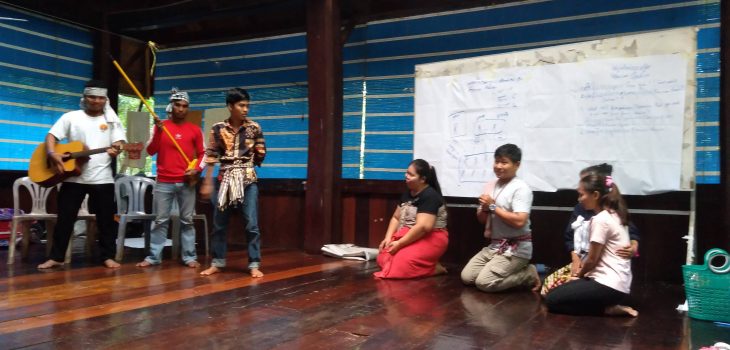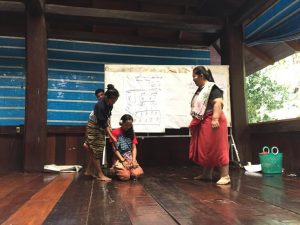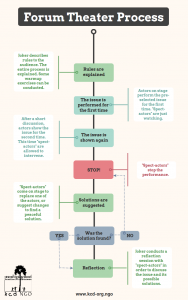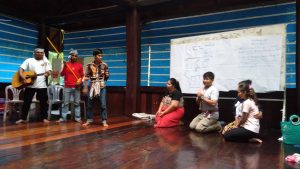
What is Forum Theater?
You might have probably noticed that in our articles we refer to Forum Theater (FT) as one of the primary methods for our project work. You would probably wonder what FT is and how does it work? Today we want to talk more about FT, its history, methodology and how it is implemented by KCD.
 In a nutshell, Forum Theater, also known as “Theater of the Oppressed” is a type of theater that relates to encouraging the audience to engage and influence the performance on stage, thus becoming “spect-actors” with a power to stop and change the performance. The spect-actors can either suggest different actions to the actors, or come on stage themselves to become a part of the drama and perform they own solutions to the situation. Issues dealt with in FT are often related to areas of social justice with aims to explore solutions to oppression featured in the performance.
In a nutshell, Forum Theater, also known as “Theater of the Oppressed” is a type of theater that relates to encouraging the audience to engage and influence the performance on stage, thus becoming “spect-actors” with a power to stop and change the performance. The spect-actors can either suggest different actions to the actors, or come on stage themselves to become a part of the drama and perform they own solutions to the situation. Issues dealt with in FT are often related to areas of social justice with aims to explore solutions to oppression featured in the performance.
History

Source: Augusto Boal webpage
Forum Theater was invented by Brazilian theater director Augusto Boal. In the 1960s he was traveling with his theater troupe around the poorest places in Brazil staging productions which urged action against various injustices and oppressors. Most of the performances were sending the message that oppressed peasants should stand up and fight the injustice. One of the peasants took the message very seriously and asked the actors to take their arms and help him fight his oppressive landowner. The actors had to explain that their guns were actually fake and they could not support the poor man. After that he left blaming the actors that they were not willing to take risks they were asking others to take. This case had a big influence on Boal and he decided he would never write plays that send messages or give advise.
Later, in 1973, Boal was applying the “simultaneous dramaturgy” theater in Peru. The plays were based on finding a solution for the protagonist at the moment of crisis. The audience were asked to suggest their solutions which were performed by the actors on stage. During one performance, a member of the audience could not formulate his suggestion clear enough, so he was invited on the stage to perform it with the actors. This was the beginning of Forum Theater…
How does it work?
 Forum Theater starts with a short performance. It can be either rehearsed or improvised by the actors. The performance is usually about social or political issue which is of high concern for the audience. Afterwards, the performance is shown again and at this stage the audience is free to stop the drama and to suggest their own solutions to the actors, or to replace/add new characters on stage in order to find peaceful solution to the issue.
Forum Theater starts with a short performance. It can be either rehearsed or improvised by the actors. The performance is usually about social or political issue which is of high concern for the audience. Afterwards, the performance is shown again and at this stage the audience is free to stop the drama and to suggest their own solutions to the actors, or to replace/add new characters on stage in order to find peaceful solution to the issue.
All FT sessions are facilitated by the “Joker” – a person who explains the rules to the audience and guides them through the FT process. Another important responsibility of Joker is to conduct reflection about the entire thing. The Joker observes and analyzes the interventions; asks the audience to evaluate what happened and to suggest more solutions; as well as conducts the reflection session about the entire performance in order to stimulate further discussion about the issue and possible solutions.
How we do it?
 In our target areas, KCD is using FT method to create safe spaces for people to discuss their issues and find non-violent solutions to them. We strongly believe that FT is a powerful tool for local youth to find their way towards inter-ethnic peace in the community. Our youth FT team is constantly searching for topics to perform in their communities in order to stimulate discussion and bring attention to challenges that people face in their daily life. Among these topics you can find issues of discrimination, education and school drop-outs, nutrition, child rights, human security and many more.
In our target areas, KCD is using FT method to create safe spaces for people to discuss their issues and find non-violent solutions to them. We strongly believe that FT is a powerful tool for local youth to find their way towards inter-ethnic peace in the community. Our youth FT team is constantly searching for topics to perform in their communities in order to stimulate discussion and bring attention to challenges that people face in their daily life. Among these topics you can find issues of discrimination, education and school drop-outs, nutrition, child rights, human security and many more.
As Forum Theater practitioners, we are constantly trying to improve our acting and training skills with the help of our partners – professional theatre directors and practitioners from Germany and Nepal.
To get more understanding of how KCD is using FT methodology, watch our video:
If you want to see more videos, feel free to subscribe to our YouTube Channel.





